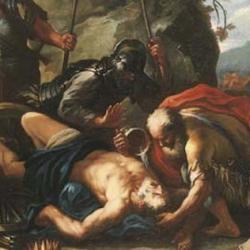The Chronicler is a generous judge of Judah’s kings. King Joash “did what was right” (2 Chronicles 24:2), even though he murders Zechariah the prophet, son of Joash’s savior, Jehoiada (24:20–21). Amaziah “did right” (25:2), even though he worshiped Edomite gods for a time (25:14–15). Uzziah “did right” (26:4), although he spent the latter part of his reign as a leper because of his sacrilegious attempt to offer incense (26:16–21).
Alone among the kings of Judah, Ahaz merits the negative judgment, “he did not do right in the eyes of Yahweh” (28:1). Unlike other kings, Ahaz doesn’t fall from early faithfulness and success. He rebels from the outset, walking in the way of the kings of Israel, setting up Baals, offering his sons in the fire in the valley of Hinnom (28:2–4). Usually, the Chronicler punningly contrasts sacrilege (ma’al) with exaltation (ma’alah). With Ahaz, the latter modifies the former: Ahaz is superlatively unfaithful, his sacrilege towers to the skies (28:19; Heb. ma’ol ma’al). For the first time, the Chronicler uses the ominous term “abomination” (to’evah) and charges Ahaz with following Canaanite practices that led to their expulsion (28:3). The threat of exile begins to loom over Judah.
Exile isn’t merely a distant prospect. It’s an immediate danger. Yahweh delivers Ahaz into the hands of the surrounding nations. Aram attacks from the east (28:5), Israel from the north (28:6), Edom from the south (28:17), and Philistia from the west (28:18). When Ahaz turns to Assyria for help, things get worse, as the Assyrians besiege Jerusalem and extract a bribe (28:20–21). In a superb bit of understatement, the Chronicler sums up: the Assyrians “did not help him” (v. 21).
The Chronicler devotes a sizeable chunk of his account of the reign of Ahaz to the war with the northern kingdom of Israel, ruled by Pekah ben Remaliah. As William Johnstone observes, when Judah is faithful, they are the undefeatable host of Yahweh; when they turn from him, they no longer function as Yahweh’s army. Ahaz’s host isn’t Yahweh’s, and Pekah scores a massive victory. Israel slaughters 120,000 warriors of Judah (28:6), and one of his mighty men penetrates far enough into Jerusalem to kill high-ranking members of the court (28:7). Pekah heads home with 200,000 women and children, captured captives (the Heb. uses the verb and noun), along with spoil (28:8). It’s the beginning of an exile for Judah, not in Egypt or Babylon, but enslaved to their brothers, the Israelites.
Then things take an astonishing twist. Somehow in the midst of the corrupted northern kingdom is a “prophet of Yahweh,” Oded. He meets the host of Pekah as they return to Samaria. He interprets Pekah’s victory as a sign of Yahweh’s burning anger against Judah, but then rebukes Israel’s army: “you have slain them in a rage that touches heaven” (28:9). He rebukes Pekah for enslaving those who were spared. The suffering of Judah has risen like prayer, like the smoke of incense or sacrifice, and Yahweh has responded. “Hear,” says the prophet: “return the captured captives” to turn away the Lord’s anger from Israel (28:11). Don’t enslave your “brothers.”
That a prophet like Oded is in the northern kingdom at all is a shock. But the bigger shock is what happens next: Four of the leading men from Ephraim/Israel listen to the prophet and stop the returning army before they get to Samaria. They confess that their guilt (ashamah, 3x in 28:13) has provoked Yahweh’s anger, and they convince the army to release the captives and return the spoil.
It’s one of the most beautiful passages in Chronicles: They lay the spoil before the “assembly” (qahal) of Israel, and from the spoil, they clothe the naked women and children, put sandals on their feet, feed them and give them water, anoint them with oil, seat the feeble on donkeys, and send them back to Jericho, the oasis “city of palms” (28:15). Israel treats the captives of Judah not as slaves but as brothers and sisters. They are generous even to the “least of these.” For a brief moment, Israel is what Israel should be, one nation, a brotherhood of generosity, ears open to the voice of Yahweh through His prophet. The echoes of this passage in the judgment scene in Matthew 25 aren’t accidental.
Johnstone observes (1 & 2 Chronicles, 2.184), “The magnanimity on the part of the north and their faithful response to the prophetic word merely serves to highlight still further Ahaz’s inadequacy on every front.” Ahaz walks in the ways of the kings of Israel more than the kings of Israel do. But there’s another aspect: Soon Judah will be removed from the land for 70 years instead of for a brief time; Babylon will cart away the spoils and enslave their men, women, and children. But the God who sent Oded to deliver Judah from Pekah of Israel will also stir the heart of Cyrus to let His people go. And, as in the days of Ahaz, they will come out with much spoil.












